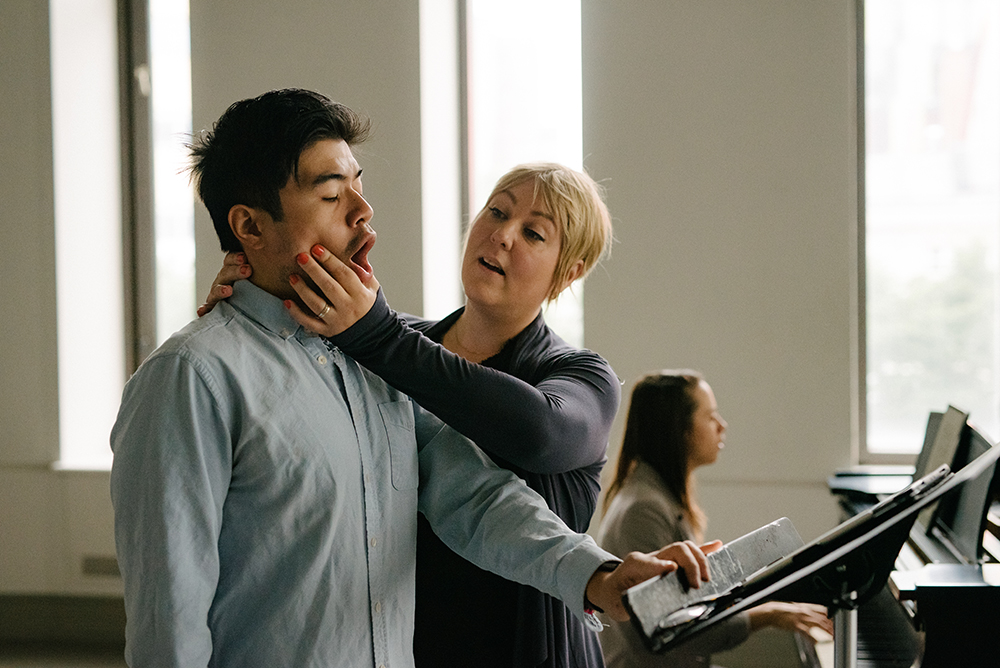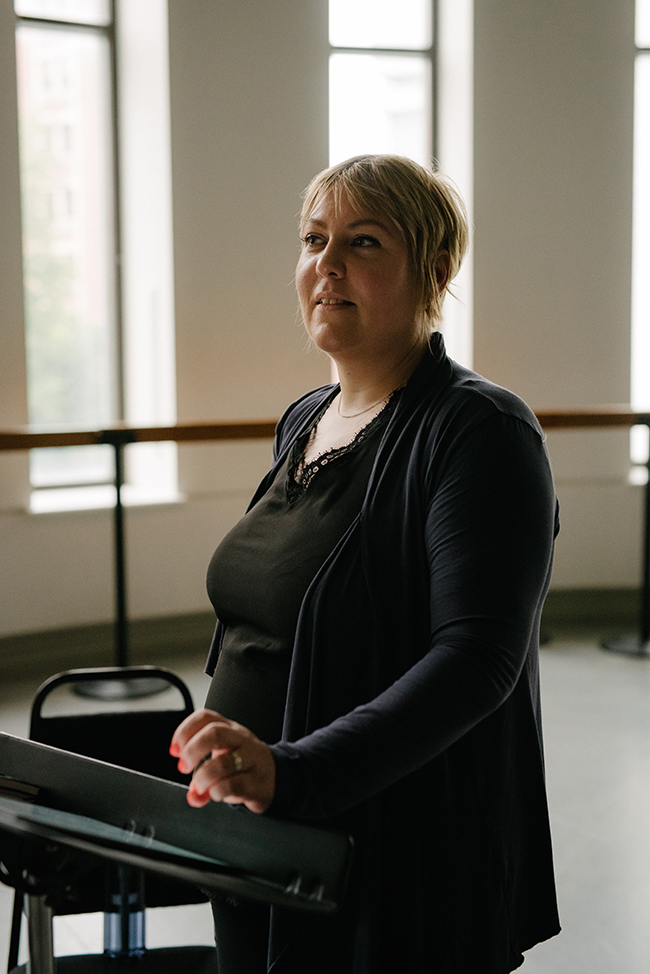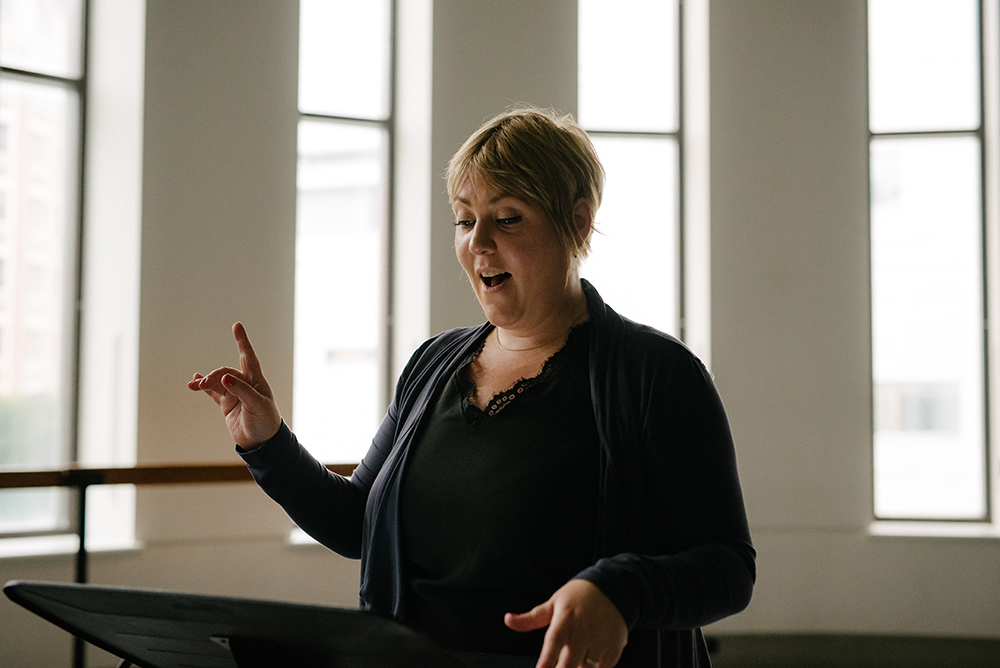Text : Véronique Gauthier
Photos : Marianne Charland
Passionate about vocal technique, in love with music, an unrivalled ear, a wise and caring guide, an avid connoisseur of the repertoire, a vocal magician: accolades rain down on Ariane Girard, a mezzo-soprano and the main voice teacher with the Atelier lyrique de l’Opéra de Montréal. And for good reason!
Guiding young artists in their vocal development within the institution since 2016, she builds on a healthy approach, close to the spoken voice, as well as on each singer’s vocal individuality, helping them to soar in the opera world. And her trajectory, far off the beaten track, contributes very valuably to her teaching.
A deep and all-encompassing love of music
Ariane’s story is anything but ordinary. A native of Lac-Saint-Jean, she grew up in an environment in which, amidst hockey and working-class reality, art was rather conspicuously absent. The young music lover nonetheless sang in a choir and dabbled on the piano, violin and clarinet, and quickly came to feel like a stranger among her own. After meeting her high school music teacher, however, the world opened up for her.
“He took me to the regional theatre, to the Saguenay-Lac-Saint-Jean Symphony Orchestra, introduced me to records. It was a breakthrough. He saved me.”
As a teenager, she would skip school to spend hours in her bedroom listening to classical, gospel, Édith Piaf, Jacques Brel. Opera was still utterly foreign to her, until one day … lightning struck.
An unexpected, instant love for opera
While watching a program on a VHS cassette, the teenager stumbled upon an advertisement for British Airways in which the Flower Duet from the opera
Lakmé is heard. Immediately fixated, the young lady rewound the videotape 10 or 20 times.
“I promptly asked my music teacher what exactly that was. He bought me a double CD titled The Best Opera Album in the World Ever that had all the greatest hits. I listened to it over and over, I took 5 or 6 singing lessons and then enrolled at the Collège d’Alma in classical voice.”
A turbulent academic career
When she entered CÉGEP, her voice had not yet been placed, even while her musicianship and artistry were already apparent. To continue her learning, Ariane, who sang soprano at the time, left her home region and headed for the big city and McGill University’s Schulich School of Music. The experience that awaited her there was far more arduous.
“I had a tricky voice, and I was sent off in all kinds of directions that were not happy ones. Despite that, I was winning competitions, I had some success. I was told that things were going well, but I was suffering. And I no longer enjoyed singing.”
By the time she had graduated, the wound in her artist heart ran deep. Since music had been her only drive, she felt lost. Fortunately, she crossed paths with two pianist coaches who saw into her. “It’s kind of ironic that two pianists were the ones who understood me vocally, while my singing teachers had not managed to. They were the ones who legitimized what I was feeling. They heard that I had a good instrument, I just wasn’t using it well.”

Perfecting her technique to serve the music
Following these encounters, Ariane began her personal quest to better understand the inner workings of the voice. “I was working at HMV at the time and had access to lots of compilations from old recordings. Claudia Muzio, Birgit Nilsson, Enrico Caruso, Ettore Bastianini, Eleanor Steber … a real gold mine! I started asking myself questions. This very real, very raw sound, why don’t we sing like that anymore? What happened? Why do I like that better than what is going on right now?”
Not finding an answer within her network in Montreal, Ariane moved to Europe for two years. France, Germany, the Netherlands: she travelled extensively, met several teachers and coaches, and drew extensively from their expertise.
“My quest for technique always boiled down to one thing: understanding and mastering my instrument, to be able to do what I want to, and be the best possible performer for the composer. We are there to serve the music. That’s why we need to develop all those technical devices. Not to become a sound machine.”
A complete rebuild
In Europe, Ariane was living her dream life. Sadly, a physical injury obliged her to return to Montreal to begin her recovery. Struggling to walk with two herniated discs, she undertook to rebuild herself both physically and vocally. “It was a heavy loss. To my mind, it was all over. To earn a living, I became a manager in a hairdressing salon. And then, I met a new voice teacher.”
It was the first time in her life she heard anyone speak about the centre of the voice, about a connection between the speaking voice and the singing voice, about phonation or the positioning of vocal cords. “Very basic things, but that nobody ever spoke to me about, which to me is nonsensical.” Alongside her practice, she read many vocal treatises and biographies of singers she admired.
“As singers, we are asked to be flexible, to be open, to meet to the conductor’s requests, but to be able to do this, we have to be well equipped!”
A teacher in high demand
Little by little, the singers in her orbit began to request the guidance of her very fine ear. “It was Marie-Eve Munger, a long-time friend, who first asked me to be her outside ear for the recording of her first album. Others then began to reach out, word-of-mouth was effectual, and my studio began to take shape.”
Her reputation spread very quickly, and the demand increased. Since then, dividing her time between her role as a teacher—running a private studio and another one with the Atelier lyrique de l’Opéra de Montréal—her singing contracts and her family (she is the mother of three young children), the mezzo-soprano strives to maintain the best possible balance between the three points of her triangle, as she calls them.
“I am a better teacher when I actually have the time to sing. It keeps me connected to what I ask of my students in terms of courage, energy, preparation, and involvement with singing on stage. It fuels me and it’s important to stay connected with all that.”
Steering young artists at a pivotal time in their careers
Getting to guide the singers of the Atelier lyrique de l’Opéra de Montréal is a privilege that this teacher delights in. “I don’t engage in a master-student relationship with them, I see myself more as a transmitter of information. Most often, by the time they have gotten here, the furniture is already fairly in order, I just need to make small adjustments and release a few keys. I give very clear information, and for the most part they are very receptive, humble, and open.”
One of her assets? Her finely honed ear. “Anyone can give a diagnosis. But once that’s done, how do we solve the problem? When I hear a singer, I feel what they are doing in my throat, in my mouth, in my palate. There is something that connects physically with what I hear. It is then that I know what path to undoing has to be taken.”

Bringing out the uniqueness in each voice
This faculty endows her with a major strength: the ability to tailor her instructions to each artist she encounters. Beyond a common foundation, there is no magic formula applicable to all. “Not everyone is coming from the same place and each individual understands things in a different way. It requires enormous flexibility and I love that. It taps into with my therapist side and my love of human beings.”
Her greatest enjoyment is closing her eyes in a hall and continuing to discern someone’s speaking voice through their singing voice. “That will always be my ultimate goal: to equip my students to sound like themselves, and not like some generic sound. That really means a lot to me.”
More than a teacher: also a mentor
Ariane guides young artists well beyond just their vocal work. “It’s one thing to sing well, but Talent with a capital T is far broader than that! Rigour in one’s work and in music, investing oneself, ethics, personality, collegiality, are all essential for a career.”
In a field to which many are called but few are chosen, another key factor in distinguishing oneself is cultivating individual creativity in developing one’s strengths. “When I was studying, a lot of emphasis was placed on one single model of a career: the international career. Fortunately, today we see more and more multifaceted and versatile artists building careers that suit them individually. At the Atelier, we encourage young people to expand their horizons and find out who they are as artists.”
A team of the crème de la crème
The 360º training that young people benefit from in the caring and accommodating context of the program is unique.
“My role with the Atelier lyrique is very clear. As a voice teacher, my job is to teach singers to sing. To give them the tools to do what is written in the score. Esther [Gonthier] is there to coach the music, there is someone for diction, someone else for mental preparation for performance… Everyone is in their zone of excellence and offers the best of themselves.”
There is no working in silos here; the watchword is, indeed, “collaboration.” The entire team, overseen by Director Chantal Lambert, who will be retiring at the end of this current season, takes an approach centred on the person to establish an environment of trust, a safe space where young people feel free to explore. “In my studio, no one is there to impress me. That’s the time to try things out, without fear of being judged. And we learn so much better in a climate of gentleness and respect.”
This is borne out by messages she has received from former members of the Atelier lyrique. “Some people write to us to say, ‘You have no idea just what an oasis the Atelier is. I felt safe, I could be who I am, you took me in and helped me lay down my roots and blossom.’ I think that’s the program’s major strength.”
Tools to spread their wings
This devoted teacher’s ultimate fulfilment is to see her students become more autonomous. “My mission is to equip them so thoroughly that they can strike out on their own. That makes me so happy! Of course, even if I’m no longer their teacher, they can come back and see me if they feel the need to, for a lesson or just to talk. I will always be there. But I won’t tie them down.”
Ariane turned all the challenges she faced in her own learning into something positive to pass on to others through her teaching. “I could have given up, but my love of music is too strong. Today, when I see my students succeed, when I see they are well, happy, that they sound like themselves, and have become teachers themselves, it’s an absolute joy!”


